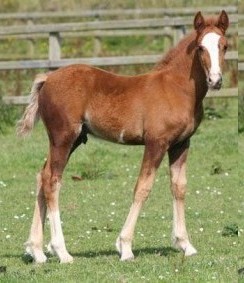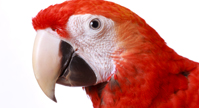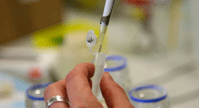IMM – Immune Mediated Myositis and MYH1 Myopathy
Description:
Immune Mediated Myositis (IMM) is an incomplete dominant autoimmune disorder which causes muscular atrophy and stiffness in Quarter Horses. Horses with two copies of the mutation associated with IMM are more likely to develop symptoms than horses with a single copy, although environmental factors can play a role. IMM typically affects horses younger than eight years old and older than seventeen years old. IMM episodes typically last several days to several weeks and can be fatal if mismanaged.
An affected horse’s immune system attacks the horse’s skeletal muscles. This attack causes the muscular atrophy and stiffness seen in horses with IMM. Horses with IMM have a mutated MYH1 gene, which codes for a protein called 2X myosin. An affected horse’s immune system is unable to tolerate the presence of this protein, leading to an attack on the muscles. Certain infections, such as a Streptococcus infection, and certain vaccines, like the influenza vaccine, are thought to potentially trigger symptoms of IMM. After an immune episode, muscle mass typically returns to the horse within a few months with proper care.
Symptoms include:
- Muscular atrophy in the back and rear
- Depression
- Loss of appetite
- Fever
- Stiffness
- Difficulty standing
Although IMM itself cannot be cured, this disorder can be managed. Corticosteroids are primarily used to help a horse ease off of an autoimmune episode and can be effective as soon as 72 hours after administration. The sooner a horse is treated, the higher the likelihood that the horse survives the episode. Furthermore, recovering horses should be fed a special protein-heavy diet in order to help them regain muscle mass. If the episode is suspected to have been caused by a vaccine, determining which vaccine caused the episode is important so as to properly manage future incidences. Horses with two copies of the mutation are at the highest risk of recurring episodes.
Horses with one copy of IMM are susceptible to having autoimmune episodes, while horses with two copies of the IMM mutation are more susceptible to an autoimmune episode and the chance of having recurring autoimmune incidences. As IMM is an inheritable disorder, it is important to test horses prior to breeding in order to best manage potential outcomes.
Breeds Affected:
Testing for IMM is curently valid for Quarter Horses and horses related to Quarter Horses.
Test Results:
| IMM/IMM | At Risk | The horse carries two copies of the missense mutation at E321G of the MYH1 gene and is homozygous for the IMM mutation. The horse has a susceptibility to developing Immune-Mediated Myositis or nonexertional rhabdomyolysis. |
| N/IMM | At Risk | Both the normal and mutant alleles at E321G of the MYH1 gene were detected. Horse tested heterozygous and has a susceptibility to developing Immune-Mediated Myositis. |
| N/N | Clear | Horse tested negative for the missense mutation at E321G of the MYH1 gene and does not have an increased susceptibility to IMM. The horse will not pass on the defective gene to its offspring. |
References:
Skelet Muscle. 2018; 8: 7. Published online 2018 Mar 6. doi: 10.1186/s13395-018-0155-0 PMCID: PMC5838957 PMID: 29510741
A missense mutation in MYH1 is associated with susceptibility to immune-mediated myositis in Quarter Horses Carrie J. Finno,corresponding author1 Giuliana Gianino,1 Sudeep Perumbakkam,2 Zoë J. Williams,2 Matthew H. Bordbari,1 Keri L. Gardner,2 Erin Burns,1 Sichong Peng,1 Sian A. Durward-Akhurst,3 and Stephanie J. Valberg2
Submit a Sample for Testing:
To submit a sample for testing please click on ORDER and download a sample submission form. Then follow the sample collection and submission instructions.
Cost per sample is $40.00. Please see our Equine Fee Schedule for all equine testing rates.










